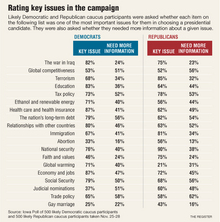One of the underanalyzed questions in the current presidential election is the extent to which the results are likely to be influenced by political ignorance. In general, primary voters are likely to be better-informed than the average citizen, and caucus goers even more so (because attendance at a caucus requires a much higher investment of time and effort and therefore tends to draw more committed voters with a higher level of interest in politics). Nonetheless, this recent Des Moines Register poll of likely Iowa caucus voters suggests that ignorance may well have a major impact even in the election with perhaps the country’s best-informed voters. The poll asked “likely” participants in the Republican and Democratic Iowa Caucuses whether they believe they need more information about 19 major issues in the campaign (click on the image to get a clearer picture):
It is striking that large numbers of likely voters admitted that they need “more information” on a variety of major issues. For example, 56 percent of Republican voters and 50% of Democrats admitted that tney need more information about Social Security – despite the fact that this issue has been extensively debated for years. Similarly, 52% of Republicans and 46% of Democrats admitted they need more information on American’s “relationship with other countries” – even though foreign policy has been perhaps the most important issue on the political agenda since 9/11. Forty percent or more of Iowa voters in both parties admitted to lacking information on eight of the other issues surveyed, including major ones such as judicial nominations, trade policy, and taxes.
These figures very likely understate the true degree of ignorance among likely Iowa voters for three reasons. First, as I point out in this article, surveys show that many respondents are unwilling to admit ignorance. For example, 20-30% will express opinions on nonexistent laws made up by pollsters rather than admit that they haven’t heard of them. Second, the more ignorant you are, the more likely you are to be unaware of the full depth of that ignorance and to underestimate the amount of information you need to be a better voter. Third and finally, Iowa caucus voters – unlike most of the rest of us – have a great deal of personal exposure to candidates. While this personal experience might itself be a source of useful information, it is also likely to lead voters to underestimate the degree of their residual ignorance, because cognitive biases lead people to overstate the signficance of information derived personal experience and underestimate the importance of more remote sources of knowledge.
It’s also worth noting that Iowa caucus voters are perhaps the best-informed in the entire country, given the amount of exposure they have to campaign information and the fact (noted above) that caucus voters are likely to be better-informed than primary voters. If Iowa caucus voters – by their own admission – lack adequate information on numerous major issues, the rest of the electorate is likely to be even worse.
